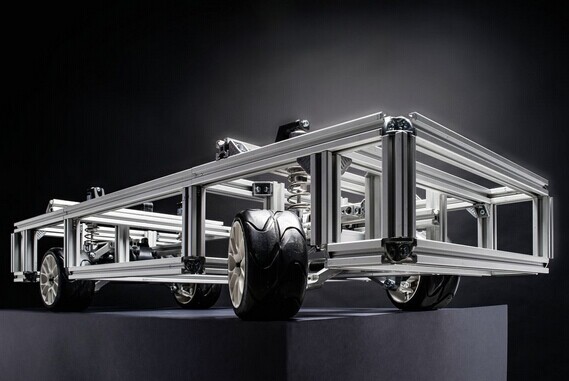Schaeffler and KIT research new assisted steering system for electric vehicles (pic)
 “Steering assistance can be provided while driving by means of an intelligent control system and suitable wheel suspension,” says Schaeffler engineer Mayer, Manager of the Automatic Driving Working Group, which is conducting the research as part of the SHARE (Schaeffler Hub for Automotive Research in E-Mobility) collaborative research project at KIT. “Only steering when stationary remains a challenge with conventional designs.”
“With our approach, the assisted steering system is part of the drive train,” explains Dr. Frey, who is a researcher at KIT’s Institute of Vehicle Systems Technology. “Steering the front wheels is carried out without using additional energy. We also want to significantly increase the quality of driving. Customer benefit, comfort, safety and reliability go hand in hand here.”
As part of the project, functional demonstrators are being built, with which the concepts can be validated and optimised in tests. It is also planned to implement the system in last year’s Formula Student racing car built by the university group KA-RaceIng with the participation of the students.
e²-Lenk is the first publicly-funded joint project as part of the SHARE collaborative research project at KIT between Schaeffler Technologies AG & Co. KG and KIT. This joint project is being managed at KIT’s East Campus in a joint project management office run by SHARE and the Institute of Vehicle Systems Technology (FAST).
Electric Mobility Cluster
Schaeffler and KIT are partners in the Electric Mobility Cluster of Excellence Southwest (ESW), which connects over 80 stakeholders from science and economics in the Karlsruhe region of Mannheim, Stuttgart and Ulm. The cluster strategy of the ESW aims to achieve intensive regional collaboration in the field of electric mobility by means of new approaches and forms of cooperation. As a result, knowledge is developed, consolidated and ultimately advantages are achieved in global competitiveness.
For more information, please contact Schaeffler UK’s Communications & Marketing Department on info.uk@schaeffler.com.
“Steering assistance can be provided while driving by means of an intelligent control system and suitable wheel suspension,” says Schaeffler engineer Mayer, Manager of the Automatic Driving Working Group, which is conducting the research as part of the SHARE (Schaeffler Hub for Automotive Research in E-Mobility) collaborative research project at KIT. “Only steering when stationary remains a challenge with conventional designs.”
“With our approach, the assisted steering system is part of the drive train,” explains Dr. Frey, who is a researcher at KIT’s Institute of Vehicle Systems Technology. “Steering the front wheels is carried out without using additional energy. We also want to significantly increase the quality of driving. Customer benefit, comfort, safety and reliability go hand in hand here.”
As part of the project, functional demonstrators are being built, with which the concepts can be validated and optimised in tests. It is also planned to implement the system in last year’s Formula Student racing car built by the university group KA-RaceIng with the participation of the students.
e²-Lenk is the first publicly-funded joint project as part of the SHARE collaborative research project at KIT between Schaeffler Technologies AG & Co. KG and KIT. This joint project is being managed at KIT’s East Campus in a joint project management office run by SHARE and the Institute of Vehicle Systems Technology (FAST).
Electric Mobility Cluster
Schaeffler and KIT are partners in the Electric Mobility Cluster of Excellence Southwest (ESW), which connects over 80 stakeholders from science and economics in the Karlsruhe region of Mannheim, Stuttgart and Ulm. The cluster strategy of the ESW aims to achieve intensive regional collaboration in the field of electric mobility by means of new approaches and forms of cooperation. As a result, knowledge is developed, consolidated and ultimately advantages are achieved in global competitiveness.
For more information, please contact Schaeffler UK’s Communications & Marketing Department on info.uk@schaeffler.com.
1.The news above mentioned with detailed source are from internet.We are trying our best to assure they are accurate ,timely and safe so as to let bearing users and sellers read more related info.However, it doesn't mean we agree with any point of view referred in above contents and we are not responsible for the authenticity. If you want to publish the news,please note the source and you will be legally responsible for the news published.
2.All news edited and translated by us are specially noted the source"CBCC".
3.For investors,please be cautious for all news.We don't bear any damage brought by late and inaccurate news.
4.If the news we published involves copyright of yours,just let us know.
Next Aug 17 Bearing Steel Price in Different Regions of China
BRIEF INTRODUCTION
Cnbearing is the No.1 bearing inquiry system and information service in China, dedicated to helping all bearing users and sellers throughout the world.
Cnbearing is supported by China National Bearing Industry Association, whose operation online is charged by China Bearing Unisun Tech. Co., Ltd.
China Bearing Unisun Tech. Co., Ltd owns all the rights. Since 2000, over 3,000 companies have been registered and enjoyed the company' s complete skillful service, which ranking many aspects in bearing industry at home and abroad with the most authority practical devices in China.



